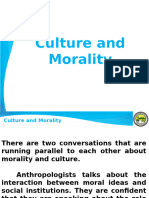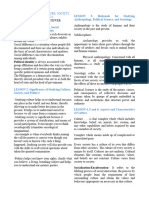IM 4.1 Ethics & Culture
IM 4.1 Ethics & Culture
Uploaded by
camsolstephen10Copyright:
Available Formats
IM 4.1 Ethics & Culture
IM 4.1 Ethics & Culture
Uploaded by
camsolstephen10Original Description:
Copyright
Available Formats
Share this document
Did you find this document useful?
Is this content inappropriate?
Copyright:
Available Formats
IM 4.1 Ethics & Culture
IM 4.1 Ethics & Culture
Uploaded by
camsolstephen10Copyright:
Available Formats
Module 2: Culture and Cultural Relativism 1
UNIVERSITY OF THE CORDILLERAS
College of Arts and Sciences
Department of Political Science
MODULE 4 IN SOCIAL SCIENCE 101N (ETHICS)
LESSON 1
CULTURE AND CULTURAL RELATIVISM
OBJECTIVES:
At the end of the topic, students are expected to:
1) Demonstrate what culture is and how it influences moral
development.
2) Explain cultural relativism in different views.
3) Discuss profoundly the advantages and disadvantages of cultural
relativism.
TEACHING-LEARNING ACTIVITY/LESSON PROPER:
WHAT IS CULTURE?
Cole (2019) defined culture as a concept that refers to a broad and diverse
collection of often intangible areas of social life. According to sociologists, culture
consists of ideals, beliefs, language systems, communication, and behaviors that
people have in common and that can be used to describe them as a group.
Culture also encompasses material objects which are special to that community
or society. Culture is distinct from the social structure and economic aspects of
society, but it is related to them both by educating and updating them on an
ongoing basis.
Lederach, (1995) introduced culture as the collective knowledge and schemes
generated by a group of people to perceive, view, convey, and react to the
social realities around them.
Zimmerman explicated (2017) culture as the characteristics and awareness of a
specific community of people, including language, religion, food, social
behavior, etiquette, fashion, music, and the arts.
From the definitions above of culture, several characteristics were drawn:
1. Culture is analects of items with cultural or historical interest.
2. Culture is a remark of peoples’ choices and admiration of beauty.
3. Culture is in harmony with the environment and an individual has a role
to play on it.
4. Culture is wider in scope as it includes beliefs, ideals, communication,
language systems, behaviors, and commonality of people within a
group.
5. Culture embraces material objects that are significant to a particular
group or society.
6. Culture is related to the social structure and economic aspects of
society.
Soc Sci 101N: Ethics Page | 1
Module 2: Culture and Cultural Relativism 2
7. Culture is a combination of the skills, talents, capacities, and artifices
brought about by a group of people to look at, relay messages, and
respond to the realities of social life.
8. Culture is the attributes and observation of a particular group of
people which includes language, religion, social behavior, etiquette,
fashion, music, and arts.
Characteristics of Culture
I. Culture is shared and transmitted.
According to Geert Hofstede, culture is a collective programming of the
mind that distinguishes the members of one group of people from another
(2005). It is shared by and is transmitted to and among the members of a
social group. Generally, culture is transmitted by means of ideas. The
acquired learning of culture is passed on to succeeding generations
primarily through language and other symbolic means of communication.
II. Culture is learned and acquired.
Not all things shared generally by people in a particular group are cultural.
Culture is not automatic. It is acquired through experiences. No one is born
equipped with a particular language, values, or knowledge.
III. Culture is a social phenomenon.
Culture is often perceived as a social phenomenon. Cultural practices and
beliefs are shaped through the interactions of individuals living in the same
social environment. Generally, culture is a product developed by many
persons interacting in a group. It is social due to the natural tendency of
human to be social, whether voluntary or not.
IV. Culture gratifies human needs.
Patterns of culture exist and persist because they continue to satisfy
human needs. People tend to habitually use systems that satiate their
basic human desires in all aspects of life.
V. Culture is dynamic.
It is dynamic and not static. It changes over time. These changes may
come in the form of discoveries, inventions, or cultural adoption.
VI. Culture is integrated.
Certain features or elements that make up a particular culture are not
random-they are integrated. The components of culture- attitudes, values,
ideals, and moral norms-are integrated into a whole system for individuals
in the same social environment to share.
Soc Sci 101N: Ethics Page | 2
Module 2: Culture and Cultural Relativism 3
Cultural Views
1. Ethnocentrism is the tendency to perceive and judge others according to one's
cultural standards. In this cultural view, one sees his or her culture as the yardstick
in judging the behaviors of others in other social contexts. For example, one who
is not exposed to the Filipino cultural habit of using one's bare hands when eating
may see it as unhygienic.
2. Xenocentrism is the tendency to value other cultures more highly than one's
own. Fascination with others' culture and contempt for one's own culture can be
traced back to a culture's colonial experience through cultural brainwashing via
media.
THE INFLUENCES OF CULTURE IN MORAL DEVELOPMENT
Leano & Gubia-on (2018), Baring (shared five points in how culture influences the
moral development of the people and these are the following:
1. Culture is always social and communal by which the relationship of the
people towards one another and their experience as people are the
culture’s meadow.
Culture is social and communal in character where the people
established and develop their relationships with each other and
learned from their experiences with them in the community. Laws,
norms, values, and attitudes serve as a binding force to enhance their
relationships. From that perspective then culture influence the moral
development of the members of the community. Yes, culture passes
from one generation to the other and probably maintains or changes
the systems, principles, and values due to transformation in society but
still retains the traditional ways that the community has.
2. The culture defines the normative principles and behaviors of society.
This refers to the definition of the principles and behaviors to be
maintained, preserved, and changed for the benefit and best interest
of the members of the community. From the relationship and
experience of the members of the community where the community
itself would be able to form certain normative principles and behaviors
to be relayed and to be taught to the members of that community.
This scenario influences the culture of that community in moral
development.
3. A culture, as best exemplified in the experience of the people,
develops restrictions and sets boundaries and limitations as they live
and relate with one another.
The restrictions and boundaries will serve as the protection and security
of the members of the community. Laws, rules, principles, and norms
will be the guidelines for the members of the
4. As culture helps in generating the character and identity of its people,
it also includes their moral character.
Culture shapes the character and identity of the people in the
community through the norms, standards, rules, regulations, and laws.
Soc Sci 101N: Ethics Page | 3
Module 2: Culture and Cultural Relativism 4
If the community is traditional or modern in character then that is the
way the members of the community will learn and experience but of
course, not all have good implications.
5. The culture identifies the authorities or the governing individuals or
groups.
The authorities serve as the maker, interpreter, and implementer of the
laws, rules, and regulations that they have in the community. Whatever
form, a system of governance that they have the roles and duties to
play in the community and their moral judgment is important in moral
issues in the community. In the family, the parents have the moral
authority over their children which is also essential for the moral
development of the members of the family as the parents are the first
who have authority to their children, who have taught and learned
from them.
Obviously, culture greatly influences the moral development of an individual.
Based on the discussions above, several points were given emphasis. As culture
considered to be as social and communal in nature, then the people within the
community able to establish and develop their relationships through learnings
and experiences in the community. Their relationships are bound by the rules,
regulations, principles norms, laws, and standards that the community has. There
are defined principles and behaviors that need to be kept, promoted, and
rejected for the best interest of the members of the community. Restrictions and
boundaries will serve as the security of the people which will be passed to them
so that are aware of them. Moreover, culture helps in generating the identity and
moral development of the members of the community through the standards,
norms, rules, principles, and laws. The maxims to be followed by them. The
authorities direct the community for the proper enforcement of the rules,
regulations, and laws for the welfare of everyone.
CULTURAL RELATIVISM
Below are the definitions of cultural relativism of the various authors:
Cultural relativism means that we do not judge a society by our own criteria of
what is right or wrong, odd or natural. Rather, we will make an effort to
understand the cultural traditions of other communities in their own cultural
context. (https://www.khanacademy.org/test-prep/mcat/society-and-
culture/culture/a/cultural-relativism- article)
Cultural relativism is the desire to consider a culture on its own terms and not to
make conclusions based on the norms of one's own community. The goal of this
is to foster the awareness of the cultural traditions that are not usually part of one's
own culture. (Philosophy Home, 2009. http://www.cultural-relativism.com/,
Lorber, Judith. “Night to His Day”: The Social Construction of Gender.” From
Inquiry to Academic Writing: A text and Reader. Boston: Bedford/St. Martin’s,
2008. 617-)
The concept of cultural relativism also means that any opinion on ethics is subject
to the perspective of each person within their particular culture. In a holistic
understanding of the term cultural relativism, it tries to promote the understanding
of cultural practices that are unfamiliar to other cultures such as eating insects,
Soc Sci 101N: Ethics Page | 4
Module 2: Culture and Cultural Relativism 5
genocides or genital cutting. (https://courses.lumenlearning.com/cultural
anthropology/chapter/cultural-relativism/)
Cultural relativism (CR) is a moral theory that contends that there are no objective
universal moral rules, and the moral rules that do exist are culturally bound. In
other words, there is a negative claim that there are no moral claims such as that
killing is wrong that would apply to every culture, and there is a positive claim that
there are moral rules, but they vary depending on culture, society, and context.
(http://davidagler.com/teaching/bioethics/ethicaltheories/Handout2_CulturalR
elativism.pdf)
Generally, CR is an attitude towards the meaning and role of values in various
cultures. CR means that the beliefs in terms of norms and behaviors in a particular
culture are specific to that society. (https://shodhganga.inflibnet.ac.in/
bitstream/10603/51330/9/09.chapter%202.pdf)
The definitions of cultural relativism stated above are summarized to the
following:
1. In cultural relativism, no one can judge a society by their standards in
the principle of right or wrong, eccentric or natural.
2. People must understand other societies’ cultures.
3. n cultural relativism, the aim is to strengthen our knowledge and
interpretation of the practices and cultural traditions that are not part
of our culture and that not uncommon to other cultures.
4. Cultural relativism is a moral theory that claims the idea of no objective
universal moral rules that would apply to every culture and it varies
depending on the culture of the society.
In the case of Islam, for instance, to marry five times are allowed as long as the
man is capable to support them while in Christianity, it is punishable by the law if
any man or woman are married twice as it is bigamous as stated in Article 349 of
the Revised Penal Code and the second marriage will be void from the very
beginning if the first marriage is valid under Article 35 of the Family Code. The
moral standards of every society differ from the other and for that reason, any
culture should be respected by anyone. We cannot say that it is right or wrong
because that culture permits them to do so and the other societies' cultures
would view the same that is right or wrong or vice versa. What is moral to other
societies may not be moral to our societies and what is moral to our societies may
not be moral to them. It is indeed hard to reconcile the conflicting cultures of the
societies with their respective moral standards. The boundaries would be the
understanding and acceptance of the cultures of the societies.
Soc Sci 101N: Ethics Page | 5
You might also like
- SOC404 Highlighted HandoutsDocument177 pagesSOC404 Highlighted HandoutsRaju Rocket100% (1)
- 4culture and MoralityDocument11 pages4culture and MoralityMeng lengNo ratings yet
- Ucsp Online Module 2Document5 pagesUcsp Online Module 2elie lucido100% (1)
- Ucsp 1Document5 pagesUcsp 1kathleentulop449No ratings yet
- Complexity of CultureDocument18 pagesComplexity of CultureKrystal LimNo ratings yet
- CultureDocument18 pagesCultureJohn AlbertNo ratings yet
- Understanding Culture, Society and Politics: Week - 4 & 5 Jaime J. GilbuenaDocument10 pagesUnderstanding Culture, Society and Politics: Week - 4 & 5 Jaime J. Gilbuenajosel DiwaNo ratings yet
- 3.1 Student Copy - THE CONCEPTS, ASPECTS AND CHANGES INOF CULTURE AND SOCIETYDocument14 pages3.1 Student Copy - THE CONCEPTS, ASPECTS AND CHANGES INOF CULTURE AND SOCIETYCarlisle gallardoNo ratings yet
- Module 2: Culture: Lesson 1: Meaning, Origin, Elements, Characteristics and Functions of CultureDocument7 pagesModule 2: Culture: Lesson 1: Meaning, Origin, Elements, Characteristics and Functions of Cultureangeloescol0925No ratings yet
- Understanding Culture Society and PolitiDocument15 pagesUnderstanding Culture Society and Politinezuu93No ratings yet
- Grade 11 Module HistoryDocument5 pagesGrade 11 Module HistoryDulce Amor Christi LangreoNo ratings yet
- Culture: Its Unity and Diversity: by Romyr Genesis M. CanariaDocument56 pagesCulture: Its Unity and Diversity: by Romyr Genesis M. CanariaLeizel Sayan-labiangNo ratings yet
- Chapter 2-Lesson2.-The Aspects of CultureDocument37 pagesChapter 2-Lesson2.-The Aspects of CultureBecky GalanoNo ratings yet
- 6 Semi Culture and MoralityDocument23 pages6 Semi Culture and MoralityJohn Daniel LatNo ratings yet
- Module 4 PDFDocument9 pagesModule 4 PDFPong MartilloNo ratings yet
- Aspects of CultureDocument16 pagesAspects of CultureAnalyn FabianNo ratings yet
- Ethics Group 4Document2 pagesEthics Group 4Norhaina AtoNo ratings yet
- Module 4 EthicsDocument95 pagesModule 4 EthicsJovie Agcaoili100% (1)
- Meaning of CultureDocument14 pagesMeaning of CultureJeremiah NayosanNo ratings yet
- Group 2 Culture and Society: Ethnocentrism & Cultural RelativismDocument5 pagesGroup 2 Culture and Society: Ethnocentrism & Cultural RelativismaleliNo ratings yet
- Unit 22Document66 pagesUnit 22Earmias GumanteNo ratings yet
- Culture L2M1Document6 pagesCulture L2M1Greggy BaldelomarNo ratings yet
- Anthropology For Year 1 - Chapt 2Document13 pagesAnthropology For Year 1 - Chapt 2Fedhasaa BonjaaNo ratings yet
- Module 4,5,6Document9 pagesModule 4,5,6m6z56pwzsxNo ratings yet
- 2 Defining Culture and SocietyDocument49 pages2 Defining Culture and SocietyDivina Gracia Ignas-De VeraNo ratings yet
- Concepts Aspects and ChangesDocument3 pagesConcepts Aspects and Changesy4368150No ratings yet
- Lesson 2.2Document3 pagesLesson 2.2eliza.tapssolanoNo ratings yet
- UCSP Week 2 OCRDocument7 pagesUCSP Week 2 OCRRocky FresnidoNo ratings yet
- Week 4 CULTURE DEFINING MORAL BEHAVIORDocument6 pagesWeek 4 CULTURE DEFINING MORAL BEHAVIORKristine Joy DungganonNo ratings yet
- 208Document10 pages208kanij3497No ratings yet
- Module 2 - CebeDocument11 pagesModule 2 - CebejasminbayanglimNo ratings yet
- Module 2 Lesson 1 Culture in Moral BahaviorDocument47 pagesModule 2 Lesson 1 Culture in Moral Bahaviorzzrot1100% (1)
- ANTH 1012 Note Unit 3 SummaryDocument8 pagesANTH 1012 Note Unit 3 SummaryakalewoldkaleabNo ratings yet
- Anthropology(UNIT 2)Document14 pagesAnthropology(UNIT 2)Solomon DawitNo ratings yet
- Aspects of CultureDocument29 pagesAspects of CultureBecky GalanoNo ratings yet
- OK Lesson 2 - Defining Culture and Society - Teacher'sDocument26 pagesOK Lesson 2 - Defining Culture and Society - Teacher'sAdrian DimaunahanNo ratings yet
- Ucsp Week 3 4Document23 pagesUcsp Week 3 4anferneeespellargaNo ratings yet
- Brown and Beige Aesthetic Vintage Group Project PresentationDocument23 pagesBrown and Beige Aesthetic Vintage Group Project PresentationJirael JacobNo ratings yet
- CultureDocument39 pagesCultureAndré TiangcoNo ratings yet
- Culture 7Document32 pagesCulture 7pjsendadNo ratings yet
- Understanding Culture, Society, and Politics: Quarter 1 - Module 3Document11 pagesUnderstanding Culture, Society, and Politics: Quarter 1 - Module 3Angela Rae100% (1)
- Ucsp 1st Quarter Without Quizzes (1)Document8 pagesUcsp 1st Quarter Without Quizzes (1)leojheyechavezNo ratings yet
- Gee 3 Lecture 1 NotesDocument9 pagesGee 3 Lecture 1 Notes22bgu0824msNo ratings yet
- Culture Lecture 2Document36 pagesCulture Lecture 2TIED PK100% (1)
- Q1 Ucsp ReviewerDocument1 pageQ1 Ucsp Reviewerkristanhalili12No ratings yet
- BB A Culture and CivilizationDocument42 pagesBB A Culture and CivilizationPRIYANKA H MEHTA100% (1)
- Q.1 What Is Culture? Discuss The Characteristics of CultureDocument1 pageQ.1 What Is Culture? Discuss The Characteristics of CultureManish KumarNo ratings yet
- 1st Q - Understanding of Culture, Society and Politics ReviewerDocument5 pages1st Q - Understanding of Culture, Society and Politics Reviewerashleymae.cavadaNo ratings yet
- Unit 3Document7 pagesUnit 3Justin BorjaNo ratings yet
- Ethics and Culture Module 3Document22 pagesEthics and Culture Module 3MJ AmangasNo ratings yet
- Written Report Socio-Cultural AnthropologyDocument8 pagesWritten Report Socio-Cultural AnthropologyJo-Nathaniel G. ValbuenaNo ratings yet
- CultureDocument17 pagesCultureKisaragi AyatoNo ratings yet
- Unit 2: The Moral Agent: Topic 1: Culture and Its Roles in Moral BehaviorDocument21 pagesUnit 2: The Moral Agent: Topic 1: Culture and Its Roles in Moral BehaviorJohn Carlo LadieroNo ratings yet
- Understanding Culture, Society and PoliticsDocument20 pagesUnderstanding Culture, Society and PoliticsAllan CapulongNo ratings yet
- Lesson 2 Culture and MoralityDocument5 pagesLesson 2 Culture and Moralityjmiavaldez CañasNo ratings yet
- Sociology ReportDocument3 pagesSociology Reportabasnsryn1No ratings yet
- Week2 Q1 Ucsp Handout Abm HumssDocument7 pagesWeek2 Q1 Ucsp Handout Abm HumssJuan CruzNo ratings yet
- UCSAP JannetLopezDocument9 pagesUCSAP JannetLopezKeatelyn MogolNo ratings yet
- Navigating Diversity - Cultural Identity in a Globalized WorldFrom EverandNavigating Diversity - Cultural Identity in a Globalized WorldNo ratings yet
- Semi DiassDocument4 pagesSemi Diassrandy.bagsic06No ratings yet
- LDR400 2024 02 SGDocument60 pagesLDR400 2024 02 SG24421149No ratings yet
- Civics Form FourDocument106 pagesCivics Form FourHamisi NyalusiNo ratings yet
- RACP - Guidelines For Ethical Relationships Between Health Professionals and IndustryDocument94 pagesRACP - Guidelines For Ethical Relationships Between Health Professionals and IndustryabcNo ratings yet
- Spirituality in The WorkplaceDocument18 pagesSpirituality in The WorkplaceMuthuvarshini SNo ratings yet
- Unit 1Document8 pagesUnit 1ANISHA MODINo ratings yet
- Chapter VDocument69 pagesChapter VMangaldip MukherjeeNo ratings yet
- Group 1 - Lesson 1 Brotherhood or Violence - AlonAlvior Amora 1Document16 pagesGroup 1 - Lesson 1 Brotherhood or Violence - AlonAlvior Amora 1alissonjaytabierosNo ratings yet
- PDF Ethics Desk Reference for Counselors Second Edition Barnett downloadDocument81 pagesPDF Ethics Desk Reference for Counselors Second Edition Barnett downloadmanchoshajidNo ratings yet
- Organizational Behavior: ValuesDocument11 pagesOrganizational Behavior: Valuesthakur pherwaniNo ratings yet
- Learning-Plan-Philosophy 12-Week 1Document2 pagesLearning-Plan-Philosophy 12-Week 1Joyce Lynel LapitanNo ratings yet
- Role of International Society in Political ObligatioDocument6 pagesRole of International Society in Political ObligatioVibhutiNo ratings yet
- Sim Acc 325Document105 pagesSim Acc 325Ivan Pacificar BioreNo ratings yet
- Per Dev WLP Q2WK8Document14 pagesPer Dev WLP Q2WK8JasminKerreUllamotVillarinNo ratings yet
- NURS 324 AthabascaDocument5 pagesNURS 324 AthabascaEsaba NgoNo ratings yet
- 10 Challenges of TeachingDocument8 pages10 Challenges of TeachingJEVELYN LIBRES100% (1)
- Professionalization of Education A CritiDocument9 pagesProfessionalization of Education A CritikhadarcabdiNo ratings yet
- HV U-5 NotesDocument25 pagesHV U-5 Notesamkrkr95No ratings yet
- 8603 All SlidesDocument218 pages8603 All SlidesSimran MehmoodNo ratings yet
- Ethos Vs Ethics in IndiaDocument7 pagesEthos Vs Ethics in IndiaavdhutpatilkingNo ratings yet
- HUMANISTIC TheoryDocument6 pagesHUMANISTIC Theorykalamamark56No ratings yet
- Suggested Answer: Business Strategy May-June 2018Document10 pagesSuggested Answer: Business Strategy May-June 2018Towhidul IslamNo ratings yet
- 1.elaborate On Aesthetics Experience. Discuss With Reference To Rasa and DisinterestednessDocument6 pages1.elaborate On Aesthetics Experience. Discuss With Reference To Rasa and DisinterestednessChandra SekharNo ratings yet
- Ethics - Topic 1 - Culture, Cultural Relativism, Filipino Way and Universal ValuesDocument14 pagesEthics - Topic 1 - Culture, Cultural Relativism, Filipino Way and Universal ValuesgabgohobNo ratings yet
- 08 Corporate Ethical Governance & Accountability (MTM)Document35 pages08 Corporate Ethical Governance & Accountability (MTM)Sadman Ashiqur RahmanNo ratings yet
- Home Management ConceptDocument10 pagesHome Management Conceptalejadojudycornelia100% (1)
- Unit 1-1Document54 pagesUnit 1-1vedantsharma969No ratings yet
- Four Pillars of EducationDocument8 pagesFour Pillars of EducationRoy De GuzmanNo ratings yet
- Educational Administration The Roles of Leadership and Management 18122 RDocument159 pagesEducational Administration The Roles of Leadership and Management 18122 RKashmalaNo ratings yet
- MC Fil 101 Estruktura at Gamit NG Wikang FilipinoDocument18 pagesMC Fil 101 Estruktura at Gamit NG Wikang FilipinoReniel AsneNo ratings yet

























































































